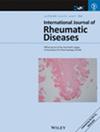Investigating the Association Between Social Support and Quality of Life in People With Rheumatoid Arthritis: A Systematic Review of the Literature
Abstract
Objective
Rheumatoid arthritis (RA) is a chronic autoimmune disease characterized by symptoms such as pain, inflammation of joints, fatigue, and impaired functionality. Depression and anxiety are common in this population of patients. Research suggests that social support, whether received or perceived, can improve the Quality of Life (QoL) of people with RA. This systematic review examined the relationship between social support and QoL in individuals with RA.
Methods
Five databases were searched with no restriction on dates. Studies were included if they used validated instruments or interventions and examined the association between QoL and social support in people with RA.
Results
Seventeen studies were included in the review, involving 2043 participants aged 18–88. Overall, the findings suggest that positive social support, whether received or perceived, enhances the QoL of individuals with RA, particularly with their mental health and also with some physical symptoms like pain. However, negative social support was found to have the opposite effect, potentially worsening the QoL for those with RA. Fatigue was also identified as indirectly mediating between social support and its impact on participants' quality of life.
Conclusion
The review underscores the significance of social support, especially from family and friends, in shaping the well-being of individuals with RA. The findings highlight the need for further research to better understand the specific types and sources of social support that are most beneficial for improving QoL, and for gold standard measurement instruments for QoL and social support in this population.


 求助内容:
求助内容: 应助结果提醒方式:
应助结果提醒方式:


